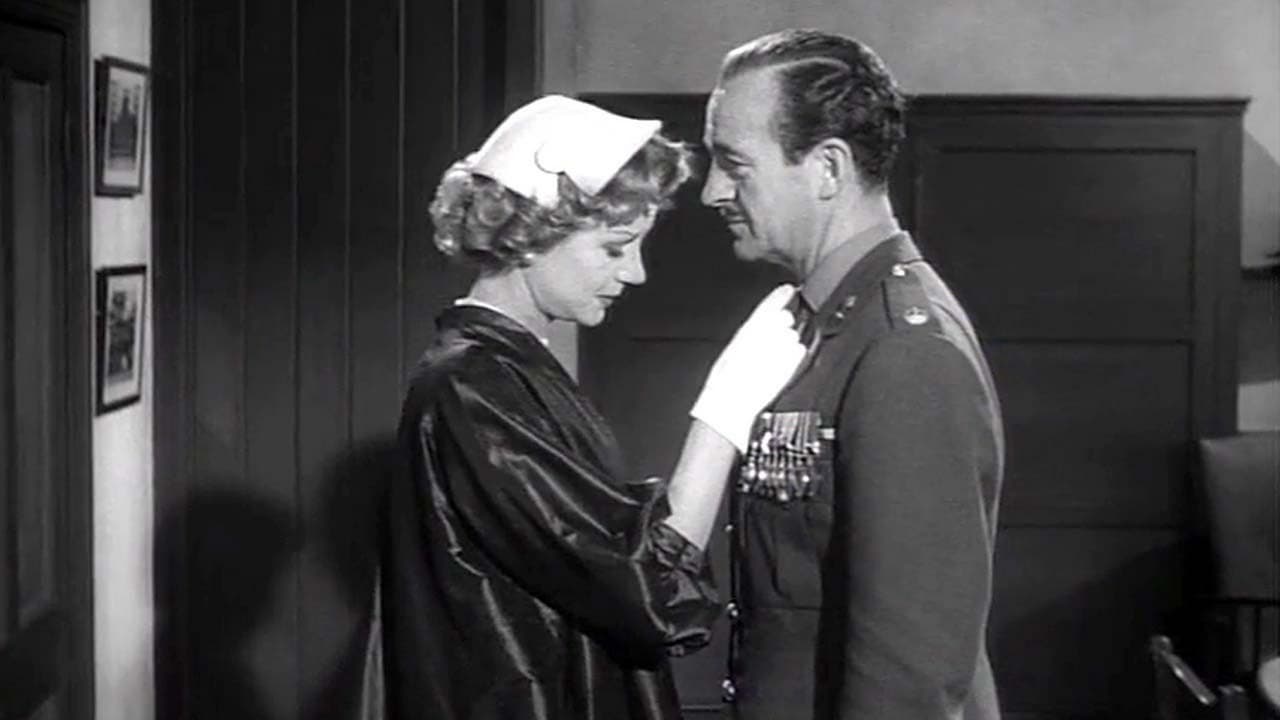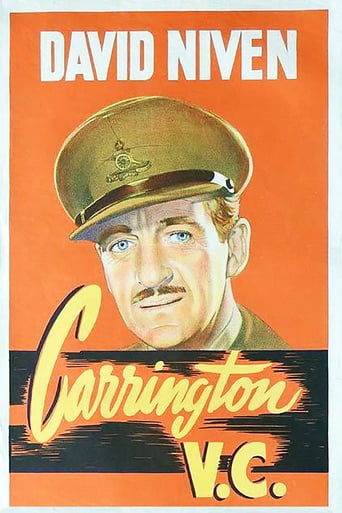

Carrington V.C. is directed by Anthony Asquith and has a screenplay by John Hunter. The film stars David Niven, Noelle Middleton,Raymond Francis, Geoffrey Keen, Allan Cuthbertson and Margaret Leighton.Major Carrington(David Niven)defends himself at a court martial. He faces three charges. Firstly he's accused of removing £125 from the safe of his army barracks. He did take the money but he claims he did so with the approval of his commanding officer Colonel Hennicker(Allan Cuthbertson). The Colonel (who is not liked by those under his command or by several of the officers on the court martial board) denies this.Carrington is also accused of being absent without leave and entertaining Captain Allison Graham(Noelle Middleton)in his room after hours. Carrington and Graham are friends but not romantically involved, that charge makes it seem otherwise.This is a really good courtroom drama. Niven is good as the decent and beloved officer who is in a bad situation. Geoffrey Keen steals all his scenes as the level headed and shrewd officer in charge of the court martial board. Noelle Middleton is good as the loyal Allison, who feels powerless to help Carrington. Margaret Leighton is memorable as Carrington's troubled wife. Allan Cuthbertson is very good as the commanding officer who is out to get Carrington. Laurence Naismith also has a small role as an officer on the court martial board.I also like that the ending is not sentimental, it's realistic and we see that it was a difficult decision to make. Good performances and a story with a few surprises on offer too.
... View MoreThe always charming David Niven, ex-Guards (Carrington), and always convincing Allan Cuthbertson, ex RAAF (Hennicker), strike big sparks off each other in this static military courtroom drama, but that's the only proper entertainment 'Carrington, VC' has to offer. The rest of it is a terribly, terribly middle-class (and low-budget) army court procedural with Geoffrey Keen as presiding officer. Geoffrey Keen is typecast as the self-important little man behind a big desk in much British film and TV of the period, and in this he gives his usual lightweight, nasal turn, along with many familiar and clearly aging Brit stalwarts who give the same routine whether in a comedy - or in uniform - or not.The whole point is whether the dashing Carrington's nemesis lies on oath about him 'borrowing' £125 from the barracks safe, ticking many socio-cultural boxes for a 1950's UK audience and weakly echoing 'The Winslow Boy'. **SPOILER**You are rewarded for sticking with the film by having Carrington found guilty, but disappointingly, the dastardly Hennicker's ultimate come-uppance is not in the film. Cuthbertson would have owned that.These days, watching women in unattractive uniforms calling one another 'Vel' for 'Val' gets old very quickly. Though if that does turn you on, the crucial, and almost throwaway telephonists' scene that sets up Carrington's (unseen) appeal will really, um, appeal. It's only Niven's easy charm, and Cuthbertson's fulminating uptightness that gave me any reason to care. The rest is khaki-coloured cardboard, mouldering away in a damp, forgotten cupboard. Skip this and rent 'Tunes of Glory (1960)' instead.
... View MoreMajor Charles Carrington (David Niven), is arrested for taking £125 from the base safe, he also face two other charges that could finish his distinguished service career. He decides to act on his own defence at his court martial hearing, his argument being that he is owed a lot of money from the army for his various postings that have cost him out of his own pocket. To further complicate the proceedings, Carrington alleges he told his superior, the very disliked Colonel Henniker, that he was taking the money from the safe. A mans career, his marriage, and quite a few reputations, all hang in the balance.Yes, well it is very British, of that there is no denying, it's very much heel to toe, cup of tea and chin chin chin. So with that in mind {i'm British myself by the way} this may grate on film viewers outside of the British Isles, but it's a really honest and interesting piece that scrutinises the British Court Martial system and rewards the court genre fans royally. Niven is, well Niven, he's always a solid professional who always earned his pay, and good support comes from the ladies of the piece, Margaret Leighton and Noelle Middleton, whilst i must give a mention to the seriously great Victor Maddern, an actor who was far from the A list of British greats but once you put the name to the face, you will see he was always memorable in what films he made.So as a court room genre fan, and of course a staunch fan of British cinema, i'm going to rate 7/10 with a disclaimer that if those outside of my shores don't get it....well you just don't get it, {nudge nudge wink wink}.
... View MoreThe major theme of this film is the role of the war hero in a peacetime army. Carrington is an undoubted hero but the rule-breaking qualities that made him a hero are not welcome in a peacetime army where bureaucratic procedures are the norm, represented in this film by Henniker, Carrington's commanding officer and an unbending stickler for the rules. So, Carrington is romantic but wrong and Henniker is dull but right. The film, filled with great ensemble acting performances, invites you to choose which you prefer. At the time the film was made, Germany had emerged from the ruins of war with Europe's most dynamic economy whereas Britain, the victor, was mired in post-war decline. Carrington was the dashing war hero but Henniker is in charge now. Henniker, who avoided action in the war, with his Germanic name and blond hair. There's a nice metaphor here. Britain won the war, but who won the peace?
... View More